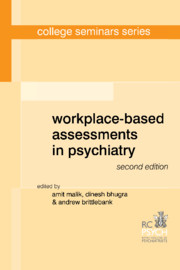Book contents
- Frontmatter
- Contents
- List of tables, boxes and figures
- List of contributors
- Preface
- 1 Introduction: changes in training
- 2 Workplace-based assessment methods: literature overview
- 3 Case-based discussion
- 4 The mini-Assessed Clinical Encounter (mini-ACE)
- 5 The Assessment of Clinical Expertise (ACE)
- 6 Multi-source feedback
- 7 Direct Observation of Non-Clinical Skills: a new tool to assess higher psychiatric trainees
- 8 Workplace-based assessments in psychotherapy
- 9 Educational supervisor's report
- 10 Portfolios
- 11 Annual Review of Competence Progression (ARCP)
- 12 Examinations in the era of competency training
- 13 Piloting workplace-based assessments in psychiatry
- 14 Developing and delivering an online assessment system: Assessments Online
- 15 A trainee perspective of workplace-based assessments
- 16 Conclusions
- Appendix 1 Assessment forms
- Appendix 2 Guide for ARCP panels in core psychiatry training
- Appendix 3 The MRCPsych examination
- Index
3 - Case-based discussion
Published online by Cambridge University Press: 01 January 2018
- Frontmatter
- Contents
- List of tables, boxes and figures
- List of contributors
- Preface
- 1 Introduction: changes in training
- 2 Workplace-based assessment methods: literature overview
- 3 Case-based discussion
- 4 The mini-Assessed Clinical Encounter (mini-ACE)
- 5 The Assessment of Clinical Expertise (ACE)
- 6 Multi-source feedback
- 7 Direct Observation of Non-Clinical Skills: a new tool to assess higher psychiatric trainees
- 8 Workplace-based assessments in psychotherapy
- 9 Educational supervisor's report
- 10 Portfolios
- 11 Annual Review of Competence Progression (ARCP)
- 12 Examinations in the era of competency training
- 13 Piloting workplace-based assessments in psychiatry
- 14 Developing and delivering an online assessment system: Assessments Online
- 15 A trainee perspective of workplace-based assessments
- 16 Conclusions
- Appendix 1 Assessment forms
- Appendix 2 Guide for ARCP panels in core psychiatry training
- Appendix 3 The MRCPsych examination
- Index
Summary
Case-based discussion is in part derived from and is a close cousin to case-based assessment, and is used in the performance assessments of the General Medical Council (GMC) and National Clinical Assessment Service (NCAS). It has been a key element of the assessment programme for psychiatrists in training under the guidance of the Royal College of Psychiatrists since 2007. Its incorporation within the systems for recertification and thus revalidation for psychiatrists in established practice has now been piloted. This chapter discusses the origins of the instrument in Canada and the USA before describing its use in the UK. The tool is placed within the context of contemporary postgraduate medical education and the Royal College of Psychiatrists’ curricula, offering practical guidance on how best to use this method for the assessment of reasoning and judgement. Finally, some questions are posed with regard to the potential use of case-based discussion in the proposals for revalidation.
Case-based discussion enables a documented, structured interview about a real case by a doctor who has been involved or is responsible for the assessment and treatment of the patient. The starting point is either a case note or patient record for any patient for whom the doctor has significant involvement and responsibility, or an observed interview/assessment with a patient. Case-based discussion is a powerful educational tool for the assessment of progress, the attainment of clinical competencies and the setting and resetting of educational objectives.
Aims and application of case-based discussion
The aim of case-based discussion is to enable an assessor to provide systematic assessment and structured feedback to another doctor (usually a trainee). It can enable assessment of clinical decision-making, clinical reasoning and the application of medical knowledge on real patients for whom the doctor under assessment has direct responsibility. It is one element of the assessment programme for doctors in training in psychiatry.
- Type
- Chapter
- Information
- Workplace-Based Assessments in Psychiatry , pp. 28 - 44Publisher: Royal College of PsychiatristsPrint publication year: 2011

